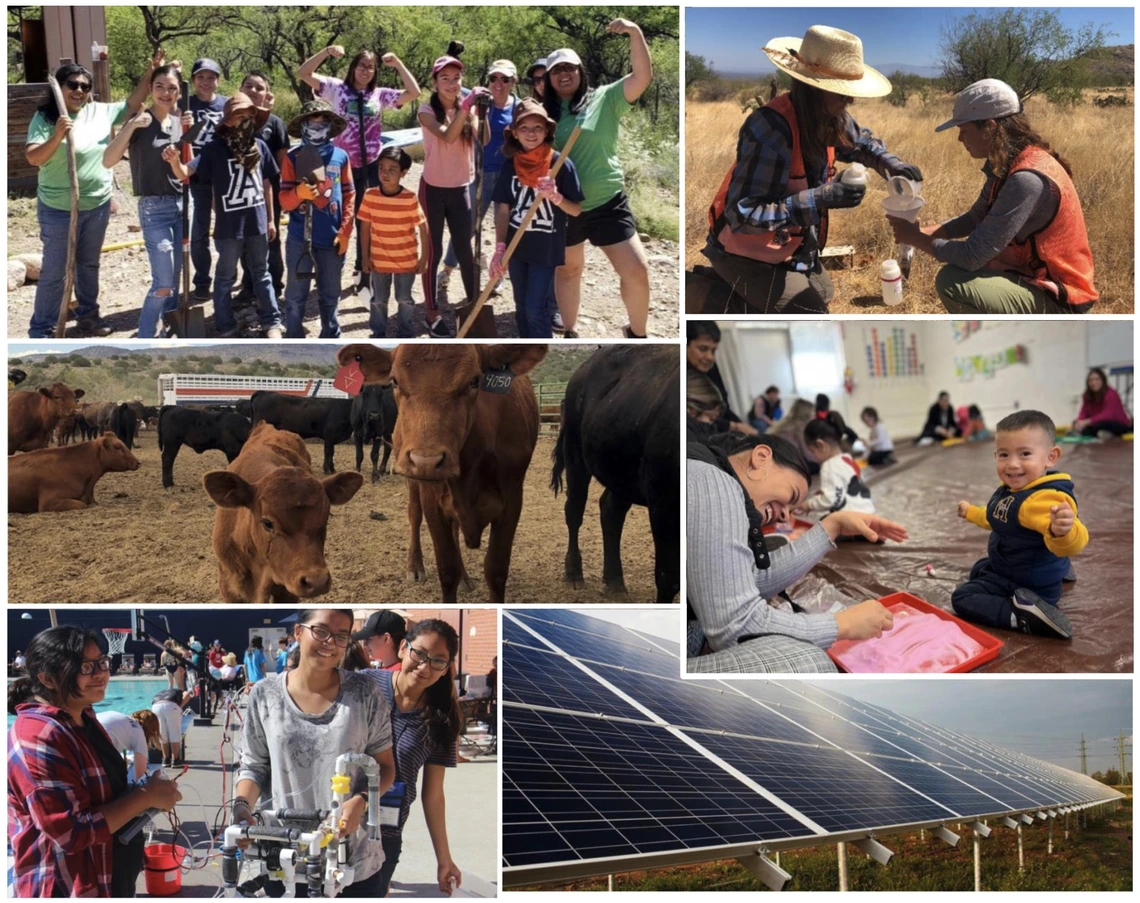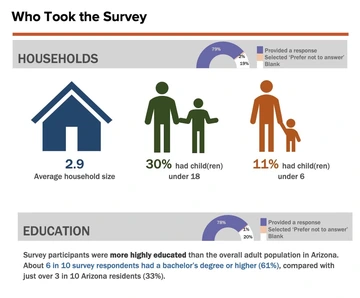University of Arizona Web Dashboard Opens Needs Assessment Data to Public
The new tool developed for Cooperative Extension by the Norton School of Human Ecology offers a snapshot of Arizona community concerns.

Cooperative Extension
A new web-based tool will help University of Arizona Cooperative Extension meet state residents’ needs and could help a broad spectrum of community organizations do the same.
Developed to showcase data from a wide-ranging needs assessment survey conducted for Extension last year, the interactive dashboard lets users examine survey data by county, age, race, gender, and other criteria. The tool will help Extension faculty and staff align programming with what Arizona communities say is important.
Extension also created a series of reports and fact sheets breaking down survey data statewide and for each county. These are available on the Extension needs assessment page.

Cooperative Extension
“One of the goals was to not be a mirror of Extension, so much as a roadmap for possibilities,” said Madeleine deBlois, a researcher on the Norton School of Human Ecology Community Research, Evaluation and Development team, which conducted the survey and built the dashboard.
The publicly available tool can also connect educators, non-profit staff, government officials and the public with information about Arizona’s needs. The survey and dashboard are part of a multi-year effort launched last year by Associate Vice President and Director of Extension Ed Martin to develop a long-term Extension strategic action plan.
Extension recently hired Mitchen LLC, a leadership and organizational development firm founded by management consultant and 28-year North Carolina Cooperative Extension veteran Mitch Owen, to help develop the plan. The plan won’t just look at what’s happening now. It will position Extension for the 2030s and will be based on identified needs in Arizona communities, Owen said.
“Strategic work is really not about today or tomorrow. It’s really about the extended future,” he said at a recent gathering of Extension personnel. “I’m not going to tell you what the answers are. You know what the answers are. You live and work in your county offices and on your campus. You know what the challenges facing Arizona are.”
Water, Education Top Priorities
The 2022 needs assessment survey asked residents about their priorities related to health and community well-being; education and youth development; community and economic development; agriculture; and natural resources and the environment.
Extension reached more than 3,200 people, including more than 70 residents from each county. Respondents rated how important it is – from “extremely important” to “not at all important” – to address 99 issues. The result is a snapshot of Arizona residents’ top priorities for their communities.
Water conservation, quality K-12 education, and recruitment and retention of good teachers topped the list, with each labeled extremely or very important by 95 percent of respondents. Other top priorities included child abuse and neglect prevention (93 percent), water-efficient farming and ranching (92 percent), and drought planning and domestic violence prevention (91 percent each).
Although most respondents were from population centers of Pima and Maricopa counties, more people per capita took the survey in smaller counties, such as Greenlee, deBlois said.
“If you look at the number of respondents per 1,000 population, actually our more rural counties have better representation,” she said.
Most who completed the survey were familiar with Cooperative Extension, although 35 percent knew “nothing” or “a little bit” about the organization. Thirty-one percent didn’t think they had participated in an Extension program.
Trent Teegerstrom, Extension’s Associate Director for Tribal Programs who serves on the committee guiding the action plan’s development, considers reaching people who are not familiar with Extension a top priority.
“That’s a big question for the Cooperative Extension right now. How do we reach the people who don’t know who we are?” Teegerstrom said.
Survey Identifies Needs Extension Already Addressing
The survey was designed to identify concerns Extension can address, but it also revealed some priorities that Extension is already addressing.
For example, preventing child abuse and neglect was the top health and community well-being priority for respondents. Although Extension has no programs labeled as child abuse prevention, positive parenting classes are available throughout the state, Martin said.
“Maybe people don’t associate positive parenting with preventing child abuse, so maybe we have to talk about it differently,” he said.
The needs assessment, although much more robust than Extension’s 2015 survey, shouldn’t be considered a comprehensive study of Arizona’s needs. It should be viewed within a broader context, said Rachel Gildersleeve, another CRED researcher.
“This should go along with other community outreach conversations,” Gildersleeve said.
Cooperative Extension encourages educators, public officials, community organization managers, or anyone curious about Arizona's needs to check out the dashboard through this online portal.
For more information about the survey, dashboard, or to reach the CRED team, email cred@arizona.edu.

